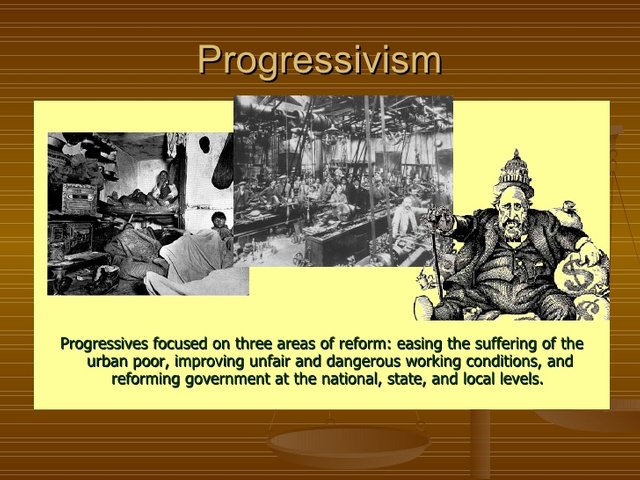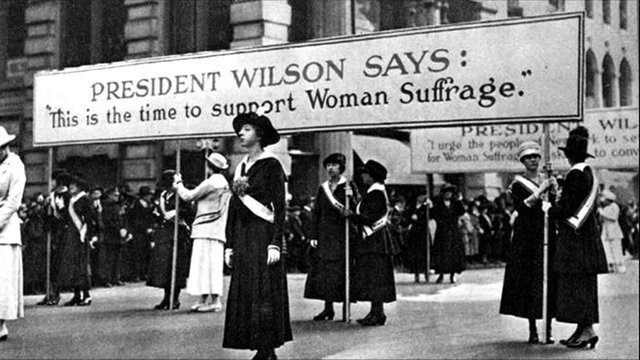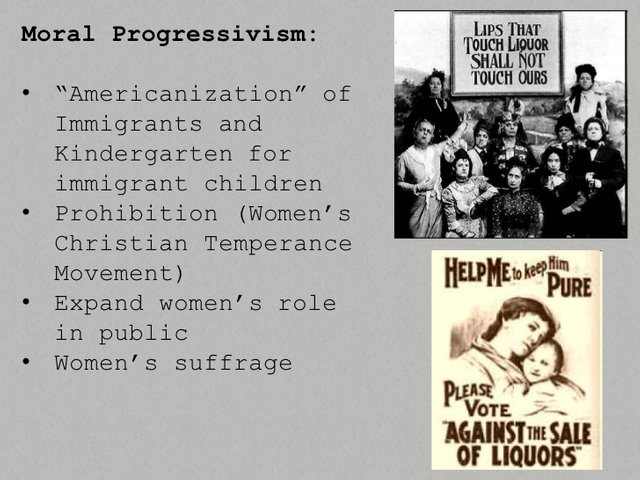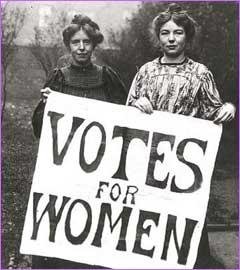PROGRESSIVISM (1890-1917) - History of USA #10
- PROGRESSIVE ERA
The Progressive Era was a period of change that began in America's urban areas. During this period reforms were affected in almost every department of American life, such as political, economic and social. The federal government passed laws regarding labor, women's rights, railroads, the food industry, politics, education and housing. The progressive leaders with faith in the traditional American ideals of democratic government, individual liberty, and rule of law and protection of private property felt that the government was corrupt and gave special privileges to the wealthy classes. They wanted majority of the people must be associated with the government and those ruling over the country must be made answerable to the electorate.
The Progressive Era was different from the previous years mostly because of the change in the attitude towards social class. In the Gilded Age (approximately 1878-99), the upper class generally believed that their wealth was God-given, and that those who lived in poverty did so because they were immoral.

With the dawn of the Progressive Era came a subtle and gradual shift in attitude. As the number of Americans living in poverty increased and their circumstances became more visible in public society, some of the most powerful members began to realize that with their good fortunes came an obligation to help those in need. Steel magnate Andrew Carnegie primarily fostered their belief, calling his philosophy the "Gospel of Wealth." Carnegie believed that simply giving money to the poor did nothing more than continue the cycle of poverty, and that, instead, assistance should help the poor help themselves, with community-based services, training and libraries. Philanthropy encouraged a sense of reform that affected nearly every social aspect of the United States.
According to Henry Bamford Parker, "Progressivism was a movement with middle class objectives, deriving much of its support from small businessmen, farmers and professional people i.e. middle class. The typical progressive leader was some lawyer, journalist or a businessman aroused by corruption or misgovernment in his own community, started a crusade to elect better man to office but he soon realized that system needed to be changed as well as men who run it".
- PROGRESSIVE PHILOSOPHY
Progressives wanted to wage war against evils like:
- Monopoly
- Corruption
- Inefficiency
- Social Injustice
Their battle cry was:
- "Use the government as an agency of human welfare".
- They were against lasses-fair economies.
- Political Progressivism.
- POLITICAL GOALS OF PROGRESSIVISM
- To use state powers of curb trusts.
- To stem the socialist threat by generally improving common man's life and labor.
Political objectives were:
- Direct primary elections instead of party based.
- Referendum by the people for final approval of laws.
- Direct elections of US Senators.
- Women Suffrage: The women were given right to vote which was not only a drastic change but a great contribution on part of this movement. This was the 19th Amendment.
- NOTABLE PROGRESSIVES
- Booker T. Washington
- Ida Tarbell
- Charlotte Perkins Gilman etc.
- PROGRESSIVE PRESIDENTS
- Theodore Roosevelt
- Harvard Taft
- Woodrow Wilson

- HALLMARKS OF PROGRESSIVE ERA
No facet of American life was untouched by reforms. Some changes came faster than others, some were intentional, and others happened as a result of outside influence and circumstances.
- Class Distinction
- Wealth Distribution
- Effects on Family Size
- Progressive Era & Rights of Women
- Urban Life & Immigrants during Progressive Era
- Life of Labor Classes
- Reforms related to Child Labor
- Education Reforms

- PROMINENT PROGRESSIVE LAWS
1. Pure food and Drug act 1906
- Federal inspection of meat
- Forbade manufacture and sale of adulterated products or poisonous patent medicines
- The act was passed in Roosevelt administration
2. Hepburn Act 1906
- Gave interstate commerce (ICC) to force the prescribed uniform system of rail roads to obey orders.
3. 16th Amendment
- Authorized income in their present form.
- Ratified in 1913.
4. Antiquates Act 1906
- Authority to place certain lands under federal control
- Passed in the time of Roosevelt
5. Federal Reserve Act 1913
- It is also called glass Owen Bill Wilson.
- Federally chartered banks were required to join Federal Reserve System.
6. Clayton Anti-Trust Act 1914
- To remove perceived deficiency in the Sherman anti-trust act 1990.
- To act forbade deliberate variation of prices intended to reduce competition.
7. New York State tenement House Act 1901
- Ban on construction of dark, airless tenement buildings in state of New York.
- Buildings must be built with windows and an open courtyard.
8. Follette Sea Man's Act 1915
- For improving conditions of labor on board ship.
9. Workmen's Compensation Act 1916
- For the benefit of Federal Civil Services.
10. Federal Aid Road Act 1917
- It provided money from federal funds for construction of roads.
11. Federal Form Loan Act 1916
- Short-term loans were provided to farmers as relatively low rates of interest.
- IMPACTS OF PROGRESSIVISM

- Revitalize democracy by making the rulers responsible to the public sentiments.
- Failed to find out a solution to the problem of Monopoly.
- Succeeded in giving powers to federation and states to to regulate big business.
- Exploitation of labor was checked.
- Protection of Natural Resources.
- The most important was that it brought about a change in attitudes of businessmen and political leaders.
- CRITICAL ANALYSIS
The Progressive Movement was an effort to cure many of the ills of American society that had developed during the great spurt of industrial growth in the last quarter of the 19th century. The frontier had been tamed, great cities and businesses developed, and an overseas empire established, but not all the citizens got their share in new wealth, prestige and optimism. Efforts to improve society were not new to the United States. A major push for change, the First Reform Era, occurred in the years before the Civil War and included efforts of social activists to reform working conditions and humanize the treatment of mentally ill people and prisoners.
Others removed themselves from society and attempted to establish communities in which reforms were limited to their participants. The focal point of early reform period was abolitionism, the drive to remove what in the eyes of many was the great moral wrong of slavery. The Second Reform Era begun during Reconstruction and lasted until the American entry into the World War I. The struggle for women's rights and the temperance movement were the initial issues addressed. A farm movement also emerged to compensate for the declining importance of the rural areas in an increasingly urbanized America. As a part of 2nd reform period, Progressivism was rooted in the belief, certainly not shared by all, that man was capable of improving the lot of all within society. As such, it was a rejection of Social Darwinism, the position taken by many rich and powerful figures of the day.
Congratulations! This post has been upvoted from the communal account, @minnowsupport, by Junaid from the Minnow Support Project. It's a witness project run by aggroed, ausbitbank, teamsteem, theprophet0, someguy123, neoxian, followbtcnews/crimsonclad, and netuoso. The goal is to help Steemit grow by supporting Minnows and creating a social network. Please find us in the Peace, Abundance, and Liberty Network (PALnet) Discord Channel. It's a completely public and open space to all members of the Steemit community who voluntarily choose to be there.
Very nice article :) Well composed
This post has received a 0.52 % upvote from @drotto thanks to: @banjo.
Sir zulqarnain's student spotted lol...anyways i am glad i've found all the notes in organized form,just a week before the exams